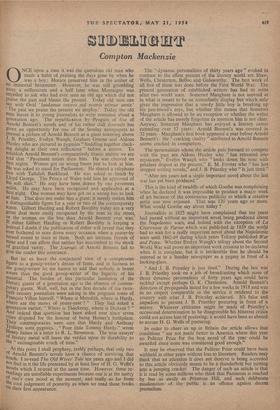Compton Mackenzie
0 NCE upon a time it was the querulous old man who made a habit of praising the days gone by when he was a boy: Horace preserved him in the amber of an immortal hexameter. However, he was still grumbling away a millennium and a half later when Montaigne was impelled to ask who had ever seen an old age which did not Praise the past and blame the present. Today old men can say with Ovid ' laudanumā¢ veteres sed nostris utiniur minis.' ' The past we praise the present we employ.' Today the old man leaves it to young journalists to write nonsense about a generation ago. The republication by Penguin of five of Arnold Bennett's novels and of his rather dull Journals has given an opportunity for one of the Sunday newspapers to present a picture of Arnold Bennett as a giant towering above J. B. Priestley, Evelyn Waugh, Graham Greene and Aldous Huxley who are pictured as pygmies " huddling together cluck- ing delight at their own reflections " before a mirror. To establish Arnold Bennett's comparatively titanic stature we are told that " Pavement artists drew him. He was cheered on first nights. Women got on wrong buses just to look at him. he was asked to stand for Parliament. He shared a telephone box with Tallulah Bankhead. He was asked to lunch by Lloyd George. The Prince of Wales told him he approved of his soft shirt." He may have been drawn by one pavement artist. He may have been recognised and applauded at a first night. One woman may have got on a wrong bus to look at him. That does not make him a giant; it merely makes him a distinguishable figure for a year or two of the contemporary scene. Gilbert Harding and Robert Boothby today are a very great deal more easily recognised by the man in the streets or the woman on the bus than Arnold Bennett ever was. If either Gilbert Har4ling or Robert Boothby is keeping a journal I doubt if the publication of either will reveal that they ever bothered to note down every occasion when a passer-by turned round to stare at them. Both are intimate friends of mine and I can affirm that neither has succumbed to the shock of gratified vanity. The Journals of Arnold Bennett fail to give the reader this assurance. The " dynamic personalities of thirty years ago " evoked in contrast to the effete present of the literary world are Shaw, Wells, Chesterton, Belloc and Galsworthy. The best work of all five of them was done before the First World War. The present generation of established writers has had to write after two world wars. Somerset Maugham is not sneered at in what is meant to be an iconoclastic display but which only gives the impression that a rowdy little boy is breaking up his pen-friend's toys, but whether this means that Somerset Maugham is allowed to be an exception or whether the writer of the article has merely forgotten to mention him is not clear. Anyway, Somerset Maugham has enjoyed a literary career extending over 57 years: Arnold Bennett's was covered in 32 years. Maugham's first book appeared a year before Arnold Bennett's : the cracking vitality ' attributed to Arnold Bennett seems cracked in comparison.
The personalities whom the article puts forward to compete with the past are Aldous Huxley who " has retreated into mysticism," Evelyn Waugh who looks down his nose with petulant disgust at the present," E. M. Forster who " has just stopped writing novels," and J. B. Priestley who " is just tired."
" After ten years' not a single important novel about the last war has yet been produced."


































 Previous page
Previous page